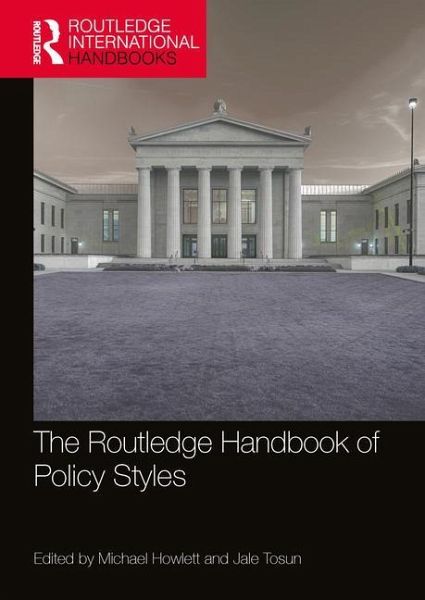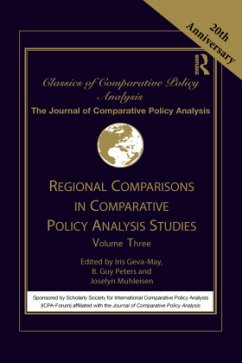
The Routledge Handbook of Policy Styles
Versandkostenfrei!
Versandfertig in 6-10 Tagen
42,99 €
inkl. MwSt.

PAYBACK Punkte
21 °P sammeln!
This Handbook provides a systematic overview of the study of policy styles provided by leading experts in the field.The book unites theoretical bases and advancements in practice, ranging from the fundamentals of policy styles to its place in greater policy studies, and responds to new questions regarding policy style dynamics across a range of government levels and activities, including contemporary trends affecting styles such as the use of digital tools and big data in government. It is a comprehensive reference for students and scholars of public policy.Key features:consolidates and advanc...
This Handbook provides a systematic overview of the study of policy styles provided by leading experts in the field.
The book unites theoretical bases and advancements in practice, ranging from the fundamentals of policy styles to its place in greater policy studies, and responds to new questions regarding policy style dynamics across a range of government levels and activities, including contemporary trends affecting styles such as the use of digital tools and big data in government. It is a comprehensive reference for students and scholars of public policy.
Key features:
consolidates and advances the contemporary body of knowledge on policy styles and defines its distinctiveness within broader policy studies;
provides a detailed picture of national policy styles in a wide range of countries as well as insights concerning sectoral and other kinds of styles within countries, including executive styles and styles of policy advice;
systematically explores questions dealing with how policy styles impact policy goals, and the realization of policies, including how styles affect instruments choices and impact;
provides a guide to future comparative research pathways and cross-sectoral dialogue on the concept and practice of policy styles.
The Routledge Handbook Policy Styles is essential reading and an authoritative reference for scholars, students, researchers and practitioners of public policy, public administration, public management as well as for comparative politics and government, public organizations and individual policy areas such as health policy, welfare policy, industrial policy, environmental policy, among others.
The book unites theoretical bases and advancements in practice, ranging from the fundamentals of policy styles to its place in greater policy studies, and responds to new questions regarding policy style dynamics across a range of government levels and activities, including contemporary trends affecting styles such as the use of digital tools and big data in government. It is a comprehensive reference for students and scholars of public policy.
Key features:
consolidates and advances the contemporary body of knowledge on policy styles and defines its distinctiveness within broader policy studies;
provides a detailed picture of national policy styles in a wide range of countries as well as insights concerning sectoral and other kinds of styles within countries, including executive styles and styles of policy advice;
systematically explores questions dealing with how policy styles impact policy goals, and the realization of policies, including how styles affect instruments choices and impact;
provides a guide to future comparative research pathways and cross-sectoral dialogue on the concept and practice of policy styles.
The Routledge Handbook Policy Styles is essential reading and an authoritative reference for scholars, students, researchers and practitioners of public policy, public administration, public management as well as for comparative politics and government, public organizations and individual policy areas such as health policy, welfare policy, industrial policy, environmental policy, among others.












